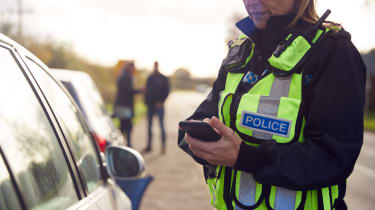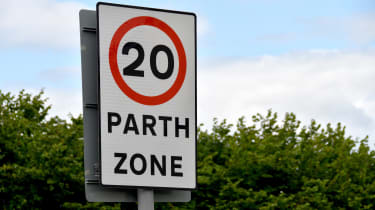Speeding fines and penalties explained: how much do you have to pay and can you appeal?
Here’s our complete guide to UK speeding fines and the appeals process

Whether you’ve received the dreaded Notice of Intended Prosecution for a speeding offence in the post or have been stopped by the police and given a speeding ticket on the spot, getting caught speeding can be a worrying and frustrating ordeal.
So how much is a speeding fine in the UK and can you appeal one? Read on as we explain everything you need to know.
Why are you issued a speeding fine?
If you’ve been caught exceeding the speed limit, you’re probably going to receive a speeding fine either on the spot or through your letterbox at a later date. Fines are handed out in order to deter speeding which could potentially put other people’s lives at risk.
In the UK, there are two main methods that are used to catch speeding motorists:
Speed camera
There are a variety of different types of speed camera on the UK’s roads, but the general rule remains the same; if you pass a speed camera while exceeding the speed limit, it will take a photograph of your vehicle and number plate and then pass these details onto the police.
If you have been snapped by a speed camera, the registered keeper of the vehicle can expect to receive a Notice of Intended Prosecution (NIP) through the post within 14 days of the offence. This will be accompanied by a Section 172 document. You must fill in the Section 172 in order to declare who was driving the vehicle at the time of the offence, and this must then be returned to the police within 28 days.
Once the driver has been declared via the Section 172, they can then expect to receive a Fixed Penalty Notice (FPN) or a court summons in the post. If you receive an FPN, this will state the exact amount you will have to pay and how many points you will receive on your licence. An FPN also gives you the option to plead not guilty but this will result in a court appeal, and a harsher punishment could be handed down if you are found guilty.
Police officer
If a police officer stops you for speeding, there are three potential outcomes that you can expect to happen. If you have only crept over the limit by a small margin, the officer may simply give you a verbal warning at their discretion and send you on your way. If you have sped by a notable amount, you will receive a Fixed Penalty Notice, just like if you were caught by a camera.
Alternatively, you may be ordered to attend court. If this happens, you’ll receive a document that instructs you what to do next. However, if your speed exceeded the limit by a significant amount, you could be arrested on the spot for dangerous driving.
What’s the punishment?
The punishment you’ll receive for speeding may vary depending on the severity of the offence and the method through which you were caught.
If you are handed a Fixed Penalty Notice via a speed camera or a police officer, you will have to pay this penalty in full or you will risk being summoned to court and potentially being punished further. You will also receive a minimum of three penalty points on your driving licence. If it is your first offence or you only exceeded the limit by a small amount, you may be given the option to attend a speed awareness course instead of paying the penalty and receiving these points.

If you are summoned to court (which is more likely if you were speeding by a significant amount or are a repeat offender), the punishment can vary quite considerably. As with any court case, if you are found not guilty you will face no further punishment. However, if you are found guilty, you could be looking at anything ranging from a much larger fine to a complete driving ban or even a custodial sentence. The outcome will mostly depend on the severity of your offence, as well as any history of prosecution.
How much is a speeding fine?
If you receive a speeding fine in the UK, the amount you are ordered to pay will vary depending on the severity of your offence and your weekly wage. The minimum penalty will be a payment of £100 and three penalty points on your driving licence, but most speeding fines are placed in one of three categories depending on your recorded speed and the applicable speed limit.
Regardless of category, all speeding fines are currently capped at £1,000, rising to £2,500 for offences that have taken place on a motorway.
In some cases, you may be offered the choice of taking a speed awareness course in order to avoid a fine and penalty points. You will only be given this option if you haven’t been convicted of speeding within the past three years, although there’s no guarantee that you will be given this option at all. If you do take a speed awareness course, attendance is mandatory and it’ll cost you around £90.
The categories for speeding fines are as follows:
| Band A | Band B | Band C | |
| Speed Limit (mph) | Recorded speed (mph) | Recorded speed (mph) | Recorded speed (mph) |
| 20 | 21 - 30 | 31 - 41 | 41 and above |
| 30 | 31 - 40 | 41 - 50 | 51 and above |
| 40 | 41 - 55 | 56 - 65 | 66 and above |
| 50 | 51 - 65 | 66 - 75 | 76 and above |
| 60 | 61- 80 | 81 - 90 | 91 and above |
| 70 | 71 - 90 | 91 - 100 | 101 and above |
| Fine | 25-75% of weekly income | 75-125% of weekly income | 125-175% of weekly income |
| Penalty points | 3 | 4 to 6 | 6 |
| Disqualification | None if licence has under 12 points | 7 to 28 days | 7 to 56 days |
There are also a further three bands: D, E and F, but these will only apply if there are more serious circumstances surrounding the speeding driver, the vehicle itself or the location where the offence took place. For example, you could be liable for a larger penalty if you are driving a heavy goods vehicle or speeding near a school.
Band D offences will incur a fine of between 200-300 per cent of your weekly income, band E sees this increase to 300-500 per cent, while band F stands at 500-700 per cent.
How do you pay a speeding fine?
If you’ve decided not to appeal, the method of paying your speeding fine will vary depending on where you are located within the UK. All speeding fines must be paid or appealed within 28 days.
If you are in England or Wales, the easiest way to pay a speeding fine is via the GOV.UK website. This process is fairly simple and all you’ll need is the Fixed Penalty Notice, your driving licence and a valid debit or credit card.
If you live in Scotland, you can use the Scottish Courts and Tribunals Service website to pay your fine, alternatively, you can pay over the phone or via the post by sending a cheque or postal order to the Scottish Courts and Tribunals Service. You can also pay in person at any court Fines Office.
The process for paying speeding fines in Northern Ireland is a little bit more complex than the rest of the UK. Both the paper and plastic parts of your driving licence will need to be surrendered to your local police station, and they will then send these off to be issued with penalty points by the Fixed Penalty Office. Once this has been carried out, you can then pay in person or by phone or post.
What happens if you don’t pay a speeding fine?
If you receive a speeding fine and simply don’t pay it or start the appeals process within 28 days, you will find yourself in more serious trouble. This will also apply if you fail to return a Section 172 document. Failure to pay or appeal will most likely result in you being summoned to court, where you will then potentially be faced with a much larger fine, court costs and maybe even a custodial sentence.
If you can’t pay a speeding fine due to financial concerns, you will need to discuss your concerns with a court. A payment instalment plan may be arranged in some circumstances, but this is not guaranteed. Legally speaking, all speeding fines are due to be paid in full at the time they are issued.
Can you appeal a speeding fine?
You have a legal right to appeal a speeding fine if you wish to, and this can be done by filling out the relevant section on a Notice of Intended Prosecution. Be warned, though, that you will have to make your case to the police. If they reject your appeal you will then find yourself in court and could face a harsher punishment if found guilty.

You should only appeal a speeding fine if you think you have a solid case for doing so. Here are some grounds on which you may wish to appeal a speeding fine, but remember, every case is unique and none of these are guaranteed to win an appeal.
Acceptable grounds for appeal
- You can provide evidence that you were not speeding.
- Another person was driving the vehicle at the time (the police will need to be informed of who the driver actually was).
- Proof of unclear or missing road signs.
Unacceptable grounds for appeal
- Speeding due to an emergency (although a court may show some leniency in select circumstances)
- Failure to realise the speed limit at the time.
- Speeding due to less traffic.
Frequently Asked Questions
There is no way to check if you’ve been caught speeding until you have received a Fixed Penalty Notice. This will happen either immediately when caught by a police officer or within around 14 days if snapped by a speed camera.
Have you ever successfully appealed a speeding fine? Tell us about your experience in the comments section...
Find a car with the experts




